The impact of the COVID-19 pandemic on the reproductive behaviour of the Russian population:
statistical and sociological analysis
The relevance of the stated topic is related to the need to summarise the results of more than three years of coronavirus infection and assess its impact on current fertility trends The ambiguity of the conclusions regarding the transformation of reproductive behaviour and the attribution of this process to the pandemic necessitates a more detailed study of this issue. The scientific problem consisted in the development of research approaches that allow solving theoretical and applied tasks to assess the impact of the COVID-19 pandemic on the reproductive behaviour of the population in modern Russia. The aim of the research is to assess the nature of the impact of the COVID-19 pandemic on the reproductive behavior of the Russian population on the basis of statistical and sociological approaches. Methods. Traditional methods of scientific research were used in the work: analysis, synthesis, grouping, comparison, generalization, structural and graphic methods. Sociological methods, such as an express survey and in-depth interview, made it possible to supplement the statistical analysis with field research materials. Research Results. On the basis of statistical data in combination with empirical data from sociological studies, it is proved that the impact of the pandemic on the reproductive behaviour of the Russian population turned out to be less pronounced than previously assumed. Without diminishing the role of coronavirus infection in the formation of current fertility trends, the authors made an attempt to identify the dependence of the reproductive behaviour of the Russian population on longer and more diverse factors that have a more significant impact in the long run. Conclusions. Reproductive behaviour of the Russian population, being a multifactorial phenomenon, was transformed insignificantly due to the pandemic. In our opinion, the transformation of reproductive behaviour of the population is slower than one could imagine at the beginning of the pandemic crisis. Probably, cardinal changes in reproductive motivation and its implementation depend more on global civilisational changes than on a short, though dangerous for humanity, pandemic crisis. The prospects of the study are focused not only on a more detailed assessment of the impact of coronavirus infection on the processes of fertility and reproductive behavior of the population, but also on the possibility of separating the pandemic factor from other factors affecting negative trends in fertility. Particular attention may be directed to the compensating role of demographic policy during the period of coronavirus infection.
Figures
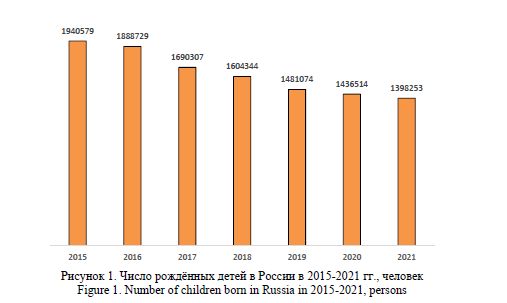
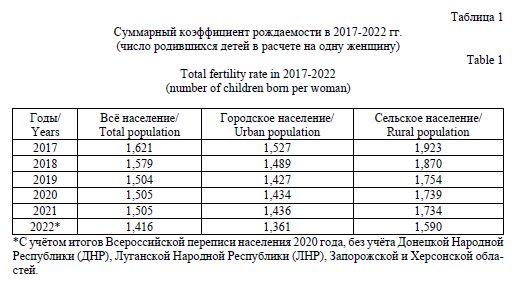
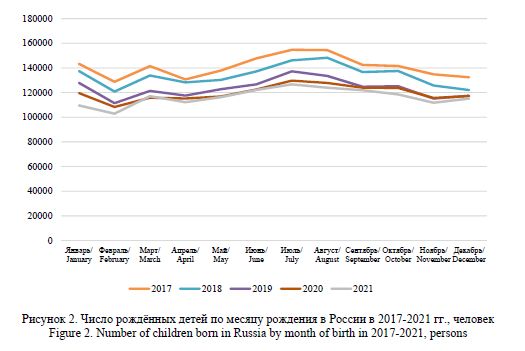
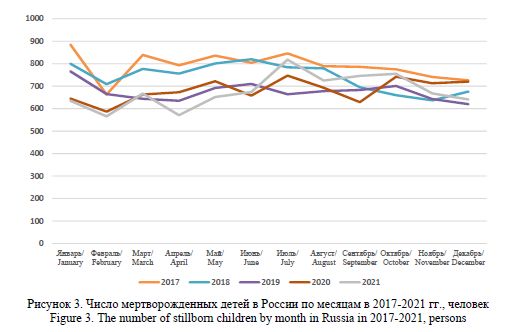
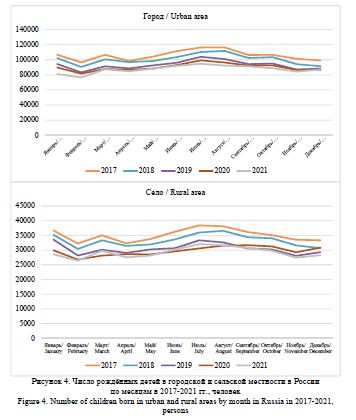
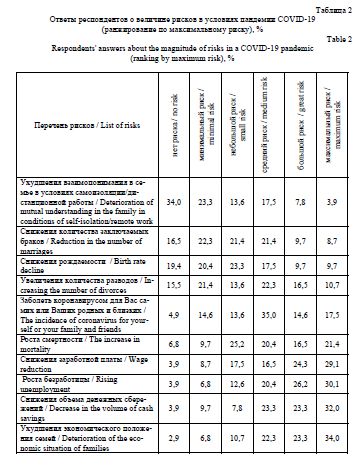
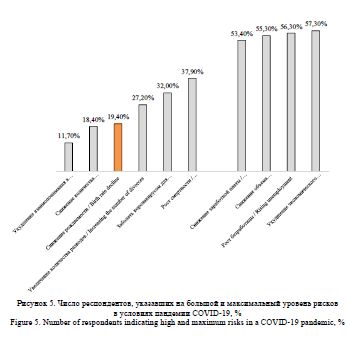
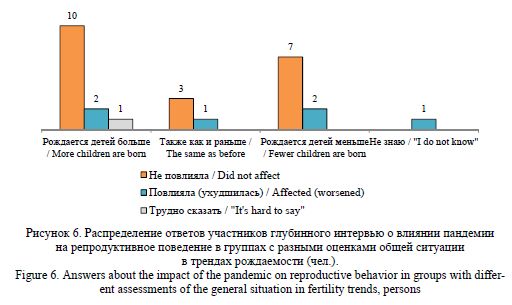
Sigareva, E. P., Sivoplyasova, S. Yu. (2023), “The impact of the COVID-19 pandemic on the reproductive behaviour of the Russian population: statistical and sociological analysis”, Research Result. Sociology and Management, 9 (3), 69-88, DOI: 10.18413/2408-9338-2023-9-3-0-6.

















While nobody left any comments to this publication.
You can be first.
Arhangelskiy, V.N. & Zajko, E.S. (2022), “Fertility and family formation in the Moscow agglomeration during the COVID-19 pandemic”, Zdorovie megapolisa, (3), [Online], available at: https://cyberleninka.ru/article/n/rozhdaemost-i-formirovanie-semey-v-moskovskoy-aglomeratsii-v-period-pandemii-covid-19 (Accessed 02 July 2023). (In Russian)
Aassve, A., Cavalli, N., Mencarini, L., Plach S. & M. Livi Bacci (2020), “The COVID-19 pandemic and human fertility”, Science, 369(6502), 370-372, [Online], available at: https://www.science.org/doi/10.1126/science.abc9520 (Aaccessed 09 September 2021). (In Russian)
Vakulenko, E. S., Makarova, M. R. & Gorskiy D. I. (2022), “Reproductive intentions and fertility dynamics of the population of different countries during the COVID-19 pandemic: an analytical review of research”, Demograficheskoe obozrenie, (4), [Online], available at: https://cyberleninka.ru/article/n/reproduktivnye-namereniya-i-dinamika-rozhdaemosti-naseleniya-raznyh-stran-v-period-pandemii-covid-19-analiticheskiy-obzor (Accessed 05 July 2023). (In Russian)
Vyzovy pandemii i strategicheskaya povestka dnya dlya obshhestva i gosudarstva: Sotsialno-politicheskoe polozhenie i demograficheskaya situatsiya v 2021 godu [The challenges of the pandemic and the strategic agenda for society and the State: Socio-political situation and demographic situation in 2021] (2021), in Anan'in M.A., Arhangel'skiy V.N., Bezverbnyj V. A. [et al.], Federalny nauchno-issledovatelskiy sotsiologichesky tsentr Rossiyskoy akademii nauk, Moscow, Russia. (In Russian)
Garaeva, Je. I. (2020), “Reproductive behavior during the COVID-19 pandemic”, Instituty razvitiya chelovecheskogo potentsiala v usloviyah sovremennyh vyzovov: sbornik statey XI Ural'skogo demograficheskogo foruma: v 2-h tomah [Institutes of human potential development in the conditions of modern challenges: collection of articles of the XI Ural Demographic Forum: in 2 volumes], Ekaterinburg, Russia, 39-42. (In Russian)
Zolotareva, O. A. & Tihomirova, A. V. (2021), “Mortality and fertility in Moscow: assessment in the context of losses from the pandemic”, Razvitie territoriy, 4 (26), [Online], available at: https://cyberleninka.ru/article/n/smertnost-i-rozhdaemost-v-moskve-otsenka-v-kontekste-poter-ot-pandemii (Accessed 11 April 2023). (In Russian)
Imideeva, I. V., Badaraeva, R. V. & Kovanova, E. S. (2023), “Demographic component of national security”, DEMIS. Demographic research, 3 (1), 12-23. (In Russian)
Kazenin, K. I. (2021), “Birth rate in Russia in 2020: regional dynamics”, Ekonomicheskoe razvitie Rossii, (3), 50-53, [Online], available at: https://cyberleninka.ru/article/n/rozhdaemost-v-rossii-v-2020-g-regionalnaya-dinamika (Accessed 13 July 2022). (In Russian)
Kazenin, K. I., Mitrofanova, E. S. (2023), “Changes in Fertility Amid the COVID-19 Pandemic: A Study of Russian Regions”, Monitoring of Public Opinion: Economic and Social Changes, (2), DOI: https:// doi.org/10.14515/monitoring.2023.2.2370. (In Russian)
Kearney, M. S. & Levine, P. (2020), “The coming COVID-19 baby bust: Update”, Brookings [Online], available at: https://www.brookings.edu/blog/up-front/2020/12/17/the-coming-covid-19-baby-bust-update/ (Accessed 19 June 2022). (In Russian)
Kovanova, E. S. & Alekseev, S. G. (2021), “The impact of the COVID-19 pandemic on the reproductive performance of young people (on the example of the Republic of Kalmykia and Buryatia)”, Rossiyskiy jekonomicheskiy internet-zhurnal, (4), [Online], available at: https://www.e-rey.ru/upload/iblock/cb9/cb953fd42bfaaa98ecf0bc9f2d946152.pdf (Accessed 20 July 2022). (In Russian)
Pandemiya COVID-19: Vyzovy, posledstviya, protivodeystvie [COVID-19 pandemic: Challenges, consequences, counteraction] (2021), in Torkunov A.V., Ryazancev S. V., Levashov V. K. (ed.), Aspekt Press, Moscow, Russia. (In Russian)
Sigareva, E. P., Sivoplyasova, S. Yu., Pletneva, Yu. Je. (2020), “Risks of demographic development in a pandemic”, in Rossiyskoe obshhestvo i gosudarstvo v usloviyah pandemii: Sotsialno-politicheskoe polozhenie i demograficheskoe razvitie Rossiyskoy Federatsii v 2020 godu [Russian society and the state in a pandemic: socio-political situation and demographic development of the Russian Federation in 2020], Publishing and Trading House "PERSPEKTIVA", Moscow, Russia, 252-273. (In Russian)
Rusanova, N. E. (2020), “Birth rate after the pandemic: “baby boom” or “demographic pit”?”, Vestnik MFYuA, (4), 151-159, [Online], available at: https://cyberleninka.ru/article/n/rozhdaemost-posle-pandemii-bebi-bum-ili-demograficheskaya-yama (Accessed 4 Fabruary 2023). (In Russian)
Rusanova, N. E. (2022), “Procreative behavior in the coronavirus pandemic: from reproductive intentions to the choice of childbirth”, Globalnye vyzovy demograficheskomu razvitiyu: sbornik nauchnyh statey v 2-h tomah [Global challenges to demographic development: a collection of scientific articles in 2 volumes], Ekaterinburg, Russia, 261-270. (In Russian)
Seredkina, E. A. (2022), “Fertility trends in developed countries during the COVID-19 pandemic”, Demograficheskoe obozrenie, (1), 109-146, [Online], available at: https://cyberleninka.ru/article/n/tendentsii-rozhdaemosti-v-razvityh-stranah-v-period-pandemii-covid-19/viewer (Accessed 03 January 2023). (In Russian)
Sigareva, E. P., Sivoplyasova, S. Yu. & Pletneva, Yu. Je. (2020), “Risks of demographic development in a pandemic”, Nauka. Kul'tura. Obshhestvo, 26(4), 98-116. (In Russian)
Sigareva, E. P., Sivoplyasova, S. Yu. & Arhangelskiy, V. N. (2022), “Fertility during the COVID-19 pandemic: expectations and reality”, Vestnik YuRGTU (NPI). Seriya: Sotsialno-jekonomicheskie nauki, 15(4), 204-218. (In Russian)
Hasanova, R. R. & Zubarevich, N. V. (2021), “Fertility, mortality and the situation of the regions at the beginning of the second wave of the pandemic”, Ekonomicheskoe razvitie Rossii (1), 77-87, [Online], available at: https://cyberleninka.ru/article/n/rozhdaemost-smertnost-naseleniya-i-polozhenie-regionov-v-nachale-vtoroy-volny-pandemii/viewer (Accessed 17 October 2022). (In Russian)
Aassve, A., Cavalli, N., Mencarini, L., Plach, S., & Sanders, S. (2021). Early assessment of the relationship between the COVID-19 pandemic and births in high-income countries. Proceedings of the National Academy of Sciences of the United States of America, 118(36), e2105709118.
Vasić, P. (2021), Covid-19 and fertility in Serbia: Rough pandemic impact assessment, Demografiya, (18), 19-38. DOI: 10.5937/demografiya2118019V.